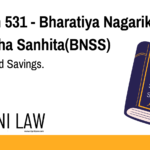Code: Section 147 BSA
Any witness may be asked, while under examination, whether any contract,
grant or other disposition of property, as to which he is giving evidence, was not contained
in a document, and if he says that it was, or if he is about to make any statement as to the
contents of any document, which, in the opinion of the Court, ought to be produced, the
adverse party may object to such evidence being given until such document is produced,
or until facts have been proved which entitle the party who called the witness to give
secondary evidence of it.
Explanation.—A witness may give oral evidence of statements made by other persons
about the contents of documents if such statements are in themselves relevant facts.
Illustration.
The question is, whether A assaulted B. C deposes that he heard A say to D—”B
wrote a letter accusing me of theft, and I will be revenged on him”. This statement is
relevant, as showing A’s motive for the assault, and evidence may be given of it, though no
other evidence is given about the letter.
Explanation of Section 147 BSA
Section 147 of the Bharatiya Sakshya Adhiniyam deals with the admissibility of oral evidence concerning matters that are required to be in writing—such as contracts, grants, or property-related documents.
Key points of this section:
- If a witness refers to a written document (such as a contract or grant), the opposite party can object to the oral evidence until the actual document is produced in court.
- If the original document cannot be produced, secondary evidence may be allowed—but only after proving the circumstances that justify its use.
- The section prevents a party from relying solely on oral testimony to prove the contents of written agreements when the writing itself should be the primary evidence.
- However, if a statement made about a document is a relevant fact in itself (e.g., a threat, motive, or confession), oral evidence of that statement is admissible.
This section aligns with the best evidence rule, which prioritizes original documents over oral accounts when dealing with written instruments.
Illustration
Example 1: Oral Evidence Objection
A witness testifies that the terms of a property transfer were agreed verbally. The opposing party objects, stating the agreement was written. The court may require the document to be produced or justify secondary evidence before allowing further testimony.
Example 2: Relevant Statement about Document
The question is whether A assaulted B. C testifies that he heard A say to D, “B wrote a letter accusing me of theft, and I will be revenged on him.” This statement is relevant as it shows motive. Even though no evidence of the letter itself is produced, the oral testimony is admissible as it relates to A’s intent.
Common Questions and Answers on Section 147 BSA
- Can oral evidence be given when a matter is required to be in writing?
Generally no. If the matter (like a contract or property transfer) should be in writing, the document must be produced. Oral evidence can be objected to unless secondary evidence is permitted by the court.
- What is secondary evidence in this context?
Secondary evidence refers to evidence that is not the original document but may be admitted if the original is lost, destroyed, or otherwise unavailable, provided proper justification is given.
- Can a witness refer to the contents of a document during examination?
Yes, but only if the document is produced in court or the court allows secondary evidence after satisfying legal requirements.
- When is oral evidence about a document admissible without producing the document?
When the oral statement itself is relevant—as in a threat, confession, or declaration that explains motive or intent—such evidence may be admissible regardless of the existence of the original document.
Conclusion
Section 147 of the Bharatiya Sakshya Adhiniyam emphasizes the importance of producing original documents in cases where the matter is expected to be in writing. It also provides a nuanced exception for statements that are independently relevant, ensuring both the integrity and flexibility of the evidentiary process.
For more in-depth legal commentary and practical examples, visit ApniLaw today.








